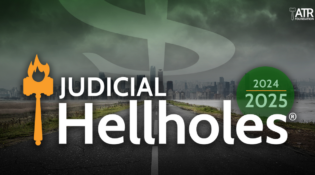The Georgia Supreme Court appeared on the Watch List in this report last year for the first time after issuing decisions over three years that significantly expanded civil liability. Unfortunately, the Peach State’s high court continued this troubling trend in 2017. Making matters worse, the state’s trial courts have been plagued by a spate of outrageous verdicts. The lower courts appear to be following the lead of the high court, expanding liability and increasing awards any chance they get.

GEORGIA
PREMISES LIABILITY
One area of Georgia law that courts there are changing fast is premises liability. The high court and lower courts alike have aggressively expanded liability for property owners. At the end of 2016 the Georgia Court of Appeals reversed a trail court decision in Miller v. Turner Broadcasting Systems. Inc., creating new Georgia law by allowing a skilled electrical worker, who was injured after working on wires that his coworker told him were live, to proceed to trial against the property owner. It had long been the rule in Georgia that a person cannot recover from a property owner for injuries suffered as a result of a hazard on the premises when the plaintiff had equal or superior knowledge of the hazard. Incredibly, however, the Georgia Supreme Court in May 2017 refused to hear the defendant’s appeal and thereby let precedent be ignored.
Georgia’s high court also increased landowners’ liability with a 2017 decision in Martin v. Six Flags Over Georgia. Here the court unanimously held that defendants can be held liable for harm to a customer occurring o the premises if criminal activity was allegedly “foreseeable.” The plaintiff was brutally attacked by assailants with no connection to the park at a bus stop outside of a Six Flags Over Georgia amusement park. To the high court’s credit, it marginally reined in an even more expansive opinion of the lower court, which would have held landowners liable for injuries outside of their premises 100% of the time.
In bad news for all Georgia property owners, other trial courts appear to be following the high court’s expansive lead on premises liability. A recent Chatham County jury found CSX Transportation liable for $3.9 million in damages for the wrongful death of a trespasser who was killed by a train while she filmed a movie. Never mind that CSX had twice denied her permission to film on the tracks. CSX plans to appeal the decision.
EXPANSION OF MEDICAL LIABILITY
In August 2017 the Georgia Court of Appeals for the Fourth Division, overturned a trial court’s decision and reinstated a vicarious liability claim in a medical liability case. The lower court had found that the claim was barred by the statute of limitations and relevant Georgia law.
But the appellate court allowed the vicarious liability claims to proceed against a medical practice, despite the fact that they were added after the two-year statute of limitations had expired. After making a vague allegation of negligence by the “treating physicians,” the plaintiff later sought to add a specific group of doctors to the complaint more than two years a er the alleged injury occurred. To support its decision, the court reasoned that it was not a new claim, it simply clarified the earlier filing; however, as the defense argued, allowing a plaintiff to add a different group of doctors to a case after the statute of limitations has run seems to ignore the purposes of the statute all together.
The case was appealed to the Georgia Supreme Court and it is up to the justices to protect the integrity of the statute of limitations.
RUNAWAY JURY VERDICTS AND THE ‘WALDEN’ DECISION
After a series of outrageous verdicts in Bryan County, Douglas County, and DeKalb County, where the awards drastically outweighed the medical expenses and reasonable compensation for the injuries claimed in the cases, all eyes are now on the Georgia Supreme Court as it considers arguably the most important case on its docket heading into 2018. The high court has an opportunity to rein in the runaway verdicts and restore balance to the system. The court granted review in Chrysler Group v. Walden in June 2017 and heard arguments in October.
The case originated in a trial court in Decatur County in 2016 and ended in the largest wrongful death and pain-and-suffering verdict in Georgia history, totaling a whopping $150 million.
The award in this case stemmed from a tragic accident in which a reckless driver rear-ended a family in their Jeep Grand Cherokee as they sat at a stoplight. The impact exploded the gas tank, causing a re which took the life of a child. At trial the judge allowed the plaintiffs’ attorney to concentrate his fire on the income of Chrysler’s CEO and otherwise suggest that company executives should go to prison instead of the driver who caused the accident. A predictably enflamed jury found the driver to be 1% at fault and Chrysler to be 99% at fault.
Incredibly, an intermediate appellate panel in November 2016 upheld the verdict, which had earlier been substantially lowered by the trial judge. But the appellate judges said they’d have upheld the initial award. So now it’s up to the Georgia Supreme Court to restore sanity. If it doesn’t, Georgia will likely find itself ranked among Judicial Hellholes before long.
Latest News

Keep the Trial Bar Out of Food and Drug Safety
Make America Healthy Again, a battle cry for Donald Trump’s presidential campaign, is an important idea that is now being
Judicial Hellholes
Junk Science Front and Center in Recent Judicial Hellholes Verdicts
The changes to Federal Rule of Evidence 702 last year were supposed to be a watershed moment for expert testimony
Judicial Hellholes
Chicago Juries Continue to Reject Junk Science, Attention Turns to Delaware
This week, a Chicago jury delivered Zantac manufacturers their second straight victory, refusing to find them liable for causing a
Points of Light
